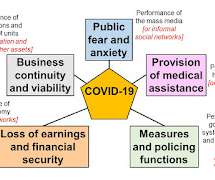Covid-19: Elements of a Scenario
Disaster Planning and Emergency Management
MARCH 11, 2020
About the same time, 2007, Dr Michael Leavitt of the US Department of Health and Human Services wrote: "We don't know when a pandemic will arrive. Based on SARS 2003 and early infection rates, a projection for the effect of Covid-19 on the airlines shows a dip for six to nine months (Pearce 2020). McCaw 2007. Mathews et al.











Let's personalize your content